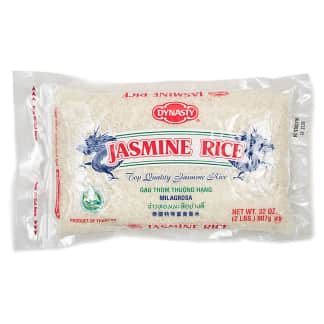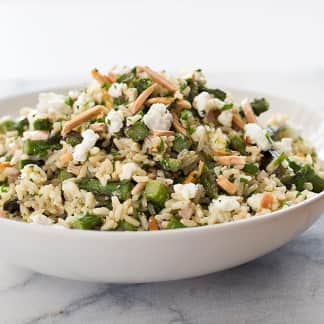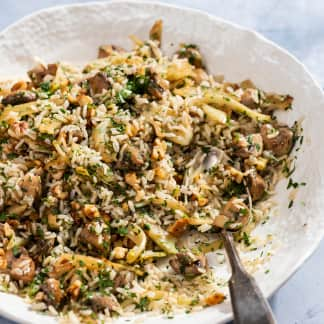Reviews You Can Trust.
See Why.
Brown Rice
Trust what’s in the bag, not on it.
Top Picks
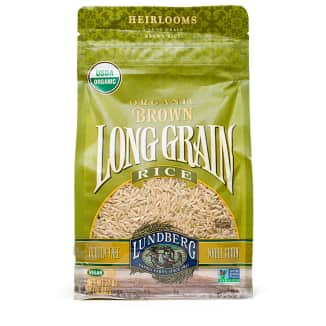
WinnerLundberg Organic Brown Long Grain Rice
This dry rice has the best instructions and works with a range of other cooking methods. Tasters said its kernels were “plump” and “almost springy,” as well as “distinct and pleasantly chewy.” They were the most flavorful, too: “buttery,” “nutty,” and “earthy.”

Best Quick RiceMinute Ready to Serve Brown Rice
This fully cooked microwavable rice isn’t perfect, but it consistently turned out decent rice in 60 seconds. The grains were “bouncy,” “almost like wheat berries.” They also come lightly oiled and salted, which tasters thought added nice flavor but which does limit control.
Sign up for the Well-Equipped Cook newsletter
Shop smarter with our ATK Reviews team's expert guides and recommendations.
What You Need to Know
Brown rice is shedding its hippie image. It’s whole-grain, gluten-free, cheap, and healthy—and according to Nielsen, national sales of brown rice increased 58 percent from 2006 to 2011. Brown rice is booming.
How We Assembled Our Brown Rice Lineup
We like brown rice plain as a side dish or in pilafs and salads. To find the best product, we surveyed supermarkets and chose seven national best sellers. We focused on long-grain rice, as it’s what we use most for its fluffy and discrete kernels. We first selected four top-selling dried products, and then because brown rice can take 45 minutes to an hour to cook, we added three prepared products to our lineup. All three are fully cooked and reheated at home in the microwave for 1 to 4 1/2 minutes, depending on the product; two are shelf-stable and one is frozen. We passed over the boxes of traditional dried instant rice; their grains are usually steamed and dried at the factory to make them cook faster, and we’ve always found them spongy.
How We Tasted Brown Rice
We tried the rice three ways, including both styles—dry and microwaveable—in each tasting. First we baked the four dried products according to our Cook's Illustrated Foolproof Oven-Baked Brown Rice recipe, and for the second we simmered them on the stovetop, following package instructions. We microwaved the three quick products per their directions, comparing them with the baked and then with the simmered dry rice. Finally, we tried all seven products in a room-temperature rice salad; we boiled the four dried products according to the recipe and microwaved the three quick products, adding them to the recipe when it called for cooked, cooled rice.
Traditional Dry Rice Trumps Instant Rice
We soon noticed our first pattern: Tasters always preferred good old-fashioned dry rice (when prepared right). It’s firmer, with a pleasant nutty bite. And convenience products, for the most part, aren’t worth it. “Did you accidentally cook the box?” asked one taster eating a shelf-stable product by one manufacturer. We looked into it and found that the rice is parboiled, just like the company’s dry instant rice; its grains were clumpy and mealy. Another flop was a frozen rice product. According to our science editor, the harsh process of cooking, freezing, and reheating causes some of the starches to form crystals that trap water, drying out parts of the grains. It also releases starch molecules called amylose, which makes the rice mushy when reheated.
One quick product, though, did turn out consistently decent; it isn’t perfect, but it’s a good fast alternative. Its grains were firmer than those of regular brown rice, earning comparisons to wheat berries and barley. But it’s also more expensive: $1.20 per 1-cup serving versus $0.25 for our winner. It comes salted and oiled, which tasters didn’t mind, but you do sacrifice control.
Don't Follow Rice Cooking Instructions on the Package
As for the dry rice, when cooked according to our own recipes, all performed admirably. Testers ranked them nearly identically in both the basic baked brown rice recipe and when boiled and cooled for the room-temperature salad. All four products had similar scores for flavor and texture, so we turned to each product’s package instructions. While we’ve perfected brown rice in our recipes, we know that sometimes people use the package for prep, too.
Talk about mixed results: When we cooked each product according to its instructions, one was great, one was decent, and two were utter mush. Wondering if we’d done something wrong, we cooked the latter two again, getting the same results: “gelatinous” “oatmeal,” “like baby food.” But these very same products were excellent in our own recipes. What gives? All the stovetop package instructions use the absorption method, meaning you add a set amount of water and a set amount of rice and cook the two together until the water is absorbed. We looked at the water ratios called for on each package and found that the best rice called for a ratio of 1 3/4 cups water to 1 cup rice; the product that was pretty good calls for 2 cups water to 1 cup rice; and the two mushy products call for 2 1/2 cups water to 1 cup rice. The mushy products don’t sell bad rice; they’re just telling you to add too much water. As an experiment, we cooked the two mushy products with the water ratio called for in our best rice, 1 3/4 cups per cup of rice, and they vastly improved.
The Best Brown Rice
Our winning rice covered all the bases. It works great with a range of cooking methods and has its own smart instructions. It is also the only company in our tasting that grows its own rice, and that level of control, coupled with smart directions, turns out consistently superior, firm, nutty grains.
Cook's CountryWatch Now
Everything We Tested
Recommended

WinnerLundberg Organic Brown Long Grain Rice
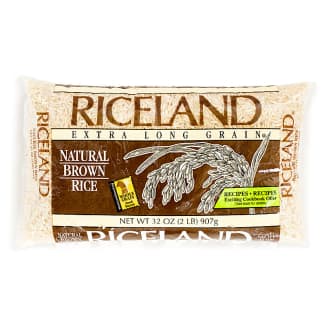
Riceland Extra Long Grain Natural Brown Rice
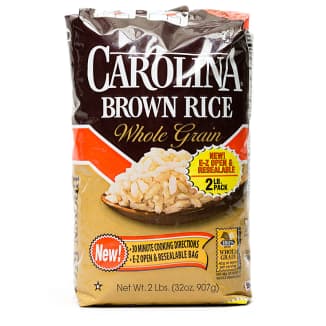
Carolina Whole Grain Brown Rice (sold as Carolina in the Northeast, Mahatma everywhere else)
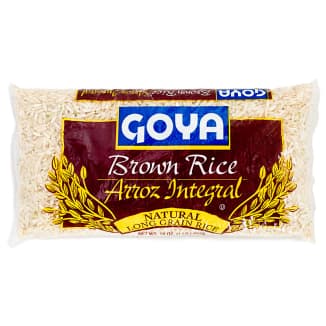
Goya Brown Rice

Best Quick RiceMinute Ready to Serve Brown Rice
Not Recommended
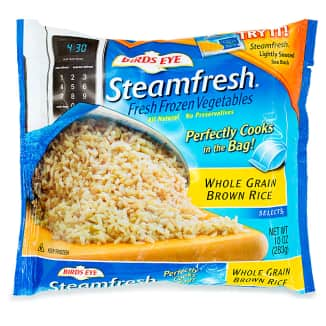
Birds Eye Steamfresh Whole Grain Brown Rice

Ben’s Original Whole Grain Brown Rice
*All products reviewed by America’s Test Kitchen are independently chosen, researched, and reviewed by our editors. We buy products for testing at retail locations and do not accept unsolicited samples for testing. We list suggested sources for recommended products as a convenience to our readers but do not endorse specific retailers. When you choose to purchase our editorial recommendations from the links we provide, we may earn an affiliate commission. Prices are subject to change.
Reviews You Can Trust
The mission of America’s Test Kitchen Reviews is to find the best equipment and ingredients for the home cook through rigorous, hands-on testing. Have a question or suggestion? Send us an email at atkreviews@americastestkitchen.com. We appreciate your feedback!
Reviews You Can Trust.
See Why.


